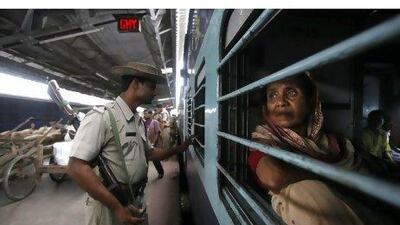MUMBAI // The Indian prime minister, Manmohan Singh, last night promised to "relentlessly pursue" the Mumbai bombers as families and friends of victims recounted the horror of the attacks.
Mr Singh said he understood the "shock and outrage of the people" of Mumbai as he visited the injured in the city's hospitals where relatives sat in tense vigils.
No group has claimed responsibility for the almost simultaneous bombings that killed 17 people on Wednesday night. A total of 131 injured were admitted to hospital, of whom 23 were in a serious condition.
As a downpour of rain complicated the work of forensic science investigators at the blast sites yesterday, police refused to speculate about who was responsible. The Home Ministry said they were interrogating suspected members of the Indian Mujahideen, a home-grown militant group, who had been arrested in Mumbai several days ago in connection with bomb blasts in Gujarat in 2008.
Padma Devi's husband, 45-year-old Vimal Kumar, was injured in the explosion in Zaveri Bazaar and taken to the orthopaedic ward at Saifee Hospital in the suburb of Girgaon. She spent the night with her husband, and believes they were among the first to arrive.
"After that, so many of them came in. They just kept coming and coming, with blood all over, bleeding from their heads," Ms Devi said. "After some time, I had to lock myself in the room. There was a lot of blood."
Outside Saifee Hospital, a dozen friends of Gopal Mahesh Prajapathi, a 22-year-old diamond sorter in Zaveri Bazaar, were waiting in the heavy rain, taking turns to use their sole visitor pass to go in and see their friend.
Mr Prajapathi, who arrived in Mumbai three years ago from the state of Gujarat, was near the Opera House when he and his friend Jainam Vora heard a blast from the direction of Zaveri Bazaar.
Mr Vora thought an old building must have collapsed. "I told Mahesh to wait outside, and I went into one of the buildings to climb the stairs and get a better look."
Then there was a second blast, much nearer, and when Mr Vora looked down, he saw his friend lying on the ground.
"Mahesh was looking up at me," he said, "and all I could see were his two legs covered in blood."
More than 12 hours after the explosion Mr Prajapathi was doing OK, said another one of his friends. "Sometimes he falls asleep because of the medication. But he is able to recognise all of us."
Terrorist attacks have become a grim feature of the urban landscape of Mumbai, India's commercial capital and its most populous city. In the past decade alone, there were attacks in 2002, 2003, 2006 and 2008 - the last being the three-day long siege of the city by terrorists from the Pakistan-based Lashkar-i-Taiba group.
One afternoon in August 2003, Sanyog Sawant heard a loud explosion from a lane to the left of his jewellery shop in the congested, narrow streets of Zaveri Bazaar.
His first thought was that a cooking gas cylinder had exploded. In fact, it was one of two bombs that went off in taxis that day in Mumbai, killing 44 people and injuring nearly 150.
On Wednesday evening, another bomb exploded in Zaveri Bazaar, this time in a lane to the right of Mr Sawant's shop. "We thought it was a cylinder blast again, so we stayed inside for a few seconds and then went out," said Nirav Shah, a salesman in the shop.
"It was only when we saw so many bodies lying around that we realised a cylinder couldn't have caused this much damage."
Mr Sawant said: "In 2003, it felt like a more magnified sound, but now I think I'm getting used to it. It's the same thing - same sounds, same reactions, same everything." Asked if he wants to move away from the seemingly cursed Zaveri Bazaar, Mr Sawant retorted: "Show me one business hub in this city that has not been a target of terrorism."
Mumbai's sheer size and its crowds have made it an ideal target for terrorists, both for the human damage they can inflict and for the ease with which this damage can be inflicted.
The Indian home minister, P Chidambaram, pointed this out at a press conference yesterday morning. In the three targeted areas, he said, the population density was "mind-boggling … I think they chose the places … where even a low-intensity blast would have a big impact."
These were also places, Mr Chidambaram said, "where you can't move two steps. Hundreds must have passed … the bag or container at Opera House, but nobody noticed. There are inherent difficulties in big cities like Mumbai."
But for all the regularity of terrorist attacks in Mumbai, those caught up in the latest atrocity were still in shock yesterday.
More than a dozen families gathered outside the burns unit at the JJ Hospital in Byculla, their worried calm was shattered periodically by screams from the curtained ward.
The morning after the attacks, 20-year-old Riya Khedekar found that her husband, Ramesh, had neither called nor come home the previous night. Mr Khedekar regularly worked long hours, and it was only later that morning that Ms Khedekar found out that he had been injured in the Zaveri Bazaar explosion.
He suffered burns on his face, neck, chest, right arm and right leg. "No one told me anything," she said, juggling two phones as she squatted outside the burn unit. "I found out when I was asked to come to the hospital."
Ms Khedekar was alone; her family was preparing for the funeral of her cousin, who was with Mr Khedekar and was killed as they were grabbing an evening snack.
ssubramanian@thenational.ae
* With additional reporting by Agence France-Presse and Associated Press

